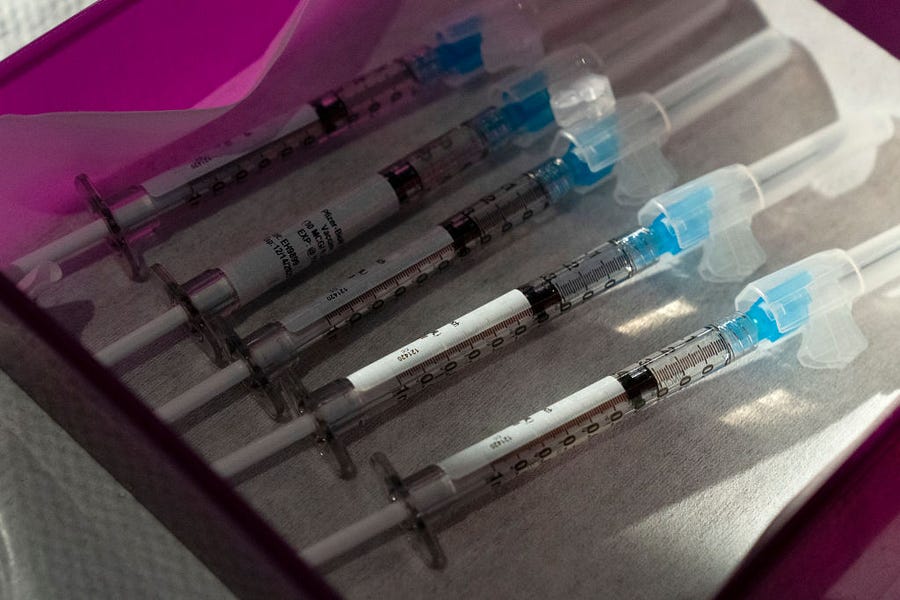In his inaugural address on January 20, President Joe Biden promised that “We will repair our alliances and engage with the world once again, not to meet yesterday’s challenges, but today’s and tomorrow’s.” But with the chaotic withdrawal from Afghanistan, the continuation of Trump’s protectionist policies, and travel restrictions imposed on Europeans, the actions of the Biden administration haven’t exactly held up to the warm and fuzzy impression that he tried to create for U.S. partners around the world.
Even with the pandemic, the optimism of the initial months of the administration—propelled by growing vaccination rates and an increasing supply of the world-best, U.S. developed, vaccines—has given way to a more depressing picture, characterized by vaccine hesitancy at home and the proliferation of the Delta variant.
If the president is serious about America “being back,” it is not too late to turn the tables. First and foremost, he must start by recognizing that the mitigation measures, adopted in 2020 as a stopgap until vaccines become available, are neither costless nor indefinitely sustainable. An alternative, long-term approach—one that accepts the virus as a part of humankind’s disease environment—is needed.
To be sure, few countries have followed the extreme examples of Australia and New Zealand, where governments are cutting themselves off from the rest of the world and imposing draconian and recurring curfew measures in an attempt to eliminate the virus altogether.
Even though most countries have sought ways to mitigate risks while also keeping their economies open, globally, the number of air passengers is still roughly half of 2019 levels. The United States continues to ban travelers from the EU, including from countries with higher vaccination rates and lower incidence of COVID-19. Having run out of patience, the EU has dropped the United States from its own ‘safe’ list, opening the way for individual member states to ban unvaccinated U.S. visitors from non-essential travel or to require them to quarantine.
For complicated reasons partly related to the pandemic, shipping costs have skyrocketed as well, to roughly six times pre-pandemic levels. As a result, the world is involved in a dangerous experiment, unprecedented in peacetime: a deliberate, policy-driven rollback of personal, cultural, and economic interconnections that, until 2020, tied the globalized world together.
Few can say what the consequences of the ongoing deglobalization will be. Yet if it’s true that, as author Matt Ridley once said in a TED talk, ideas need to “have sex” in order in order to generate innovation and progress, and if Zoom remains a rather ineffective substitute for the serendipity and spontaneity of in-person interactions, the status quo is already shaving off a significant fraction of our current and future prosperity—damage that will only get worse over time.
It does not have to be this way. Notwithstanding speculation about waning immunity, the vaccines continue to be extraordinarily effective in preventing severe cases of COVID-19. The world is also making significant strides toward higher vaccination levels—globally, the vaccination rate is at 27 percent, with 40 percent of the world’s population having received at least one dose.
That is not bad considering that the world started essentially from zero about nine months ago and that severe shortages affected even some of the wealthiest nations. Yet there is still a long way to go, particularly if booster shots are going to be necessary in the coming months.
The solution to the pandemic is the same as before: to vaccinate the world. Doing so will both reduce the magnitude of possible outbreaks and the potential for future variants, enabling the world to return to normalcy.
On that front, the contribution of the United States has been modest. About 110 million doses have been donated to developing countries, with a further 500 million doses of the Pfizer vaccine to be donated toward the global vaccine supply in 2021 and 2022. And as James Capretta noted previously in The Dispatch, it’s possible we could send doses of the Oxford/Astra-Zeneca and Novavax vaccines (both approved elsewhere but not in the U.S.) as well as extra does of the Johnson & Johnson vaccine.
Meanwhile, the IMF estimates that a mere $50 billion investment would bring the pandemic to a much faster end in developing countries, generating $9 trillion in additional global output by 2025—accruing both to wealthy and to less developed economies.
Compared to the multitrillion dollar spending bills being thrown around Capitol Hill, this is peanuts. The economic return on investment, in addition to the gains to America’s damaged standing in the world, meanwhile, are incalculable. If Biden wants to turn the page from the Afghanistan fiasco, significantly boosting U.S. efforts to distribute the vaccine globally would do just that—and hopefully restore our leadership position on the global stage.
Dalibor Rohac is a senior fellow at the American Enterprise Institute in Washington DC. Twitter: @DaliborRohac.






Please note that we at The Dispatch hold ourselves, our work, and our commenters to a higher standard than other places on the internet. We welcome comments that foster genuine debate or discussion—including comments critical of us or our work—but responses that include ad hominem attacks on fellow Dispatch members or are intended to stoke fear and anger may be moderated.
With your membership, you only have the ability to comment on The Morning Dispatch articles. Consider upgrading to join the conversation everywhere.